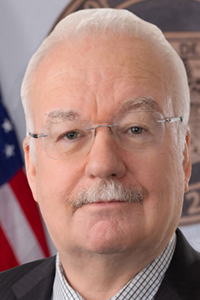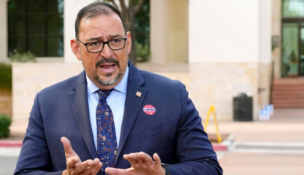Senate bill would allow residents to sue governments that electioneer
Howard Fischer, Capitol Media Services//December 29, 2024//[read_meter]
Senate bill would allow residents to sue governments that electioneer
Howard Fischer, Capitol Media Services//December 29, 2024//[read_meter]
Think your local government is using public funds to influence your vote?
Sen. John Kavanagh wants to give you a tool to do something about that.
And what the Fountain Hills Republican is proposing could even net you a $5,000 reward.
SB1036 seeks to expand existing laws that make it illegal for cities to use taxpayer dollars to convince voters to cast their ballots a certain way. Ditto counties, school districts and special districts that are seeking approval to borrow money.

Those laws, however, depend on the attorney general or county attorneys to bring such claims. If Kavanagh’s measure passes, that same right would extend to any resident.
Plus, there’s also a sweetener that might help spur someone to act.
If an individual files suit and wins the case, the offending public official has to pay back the improperly spent public monies from his or her own pocket.
That’s already in the law. So is a provision allowing a judge to impose a separate penalty of up to $5,000.
What’s new, though, is if the lawsuit is initiated by a resident, those penalties go to that person.
Kavanagh said the system of enforcing the laws on use of public monies to influence elections does work, but only when state or county prosecutors take an interest.
“The problem is that ordinary people, if they think there’s a problem, and AGs and (county) attorneys won’t do it, have no avenue to have a court review it,” he said. And Kavanagh said there are reasons that either might not wish to get involved.
Some of it, he said, might be the prosecutors lack the resources to launch and pursue a probe. But Kavanagh said there might be another factor at work, noting that both offices are run by partisan elected officials.
“Because it is political, the county attorney or AG doesn’t want to get involved when they should,” he said. “So this allows ordinary citizens to pick up the gauntlet, so to speak.”
So what’s the problem that needs to be solved?
Kavanagh said cities and towns are regularly accused of putting their finger on the scale when it comes to promoting things like borrowing authority.
“Most people are concerned when a government entity spends hundreds of thousands of dollars on mailers and sends them out with very biased information on it,” he said.
There was such a controversy in the November election in Gilbert where voters were asked to approve Propositions 497 and 498.
The first proposed a permanent increase in the town’s expenditure limit base. The second sought approval for the town to accumulate funds for capital projects without violating a state-imposed expenditure cap.
State law does allow local governments to publish informational pamphlets and other materials on upcoming ballot measures if they “present factual information in a neutral manner.”
But Gilbert also produced a video which details why both are needed — and in a way that the Goldwater Institute, in a letter to Mayor Brigette Peterson, charged was unfair.
“After telling voters they could vote ‘no’ the video goes on to list the negatives – and only the negatives – of voting no on the measures, like the inability to fund certain projects and delayed repairs,” wrote attorney Adam Shelton.
“The video does not present any argument against the propositions,” he continued. “There is no mention of the benefits that will result from voting ‘no’ on the measures. This video is neither impartial nor neutral and is therefore prohibited electioneering.”
But under the current law, all the Goldwater Institute could do was refer the matter to the county attorney who never pursued the matter. And voters ended up approving both measures.
Kavanagh said this kind of situation is not unique.
“I’ve seen a lot of informational flyers sent out by government entities, especially when it deals with bond elections, that if not crossing the line they’re really pushing it,” he said.
The senator said he’s not concerned that having private citizens empowered to sue local governments — and potentially spurred on by the chance of a financial windfall — will lead to a host of lawsuits with little or no merit. He said there are rules in Arizona courts that allow judges to impose sanctions for “frivolous” lawsuits, including ordering the party that sued to pay the legal fees of the individual or entity sued.
There is some precedent for what Kavanagh wants to do, especially with the idea of rewarding people who take action against illegal or wasteful government spending. It’s known as a “qui tam” action, referring to situations where someone files suit on his or her own behalf as well as that of the government.
Most notable is a provision in the federal False Claim Act that authorizes qui tam actions against parties who have defrauded the federal government. If successful, the party who began the action may recover up to 30% of what the government recovers.
Among the kinds of cases that have been brought are defense contractor fraud, health care billing irregularities, kickbacks and “upcoding,” the last referring to practices by medical providers who code a patient’s condition and the treatment provided when billing Medicare or Medicaid as a more expensive diagnosis than what was actually performed.


















